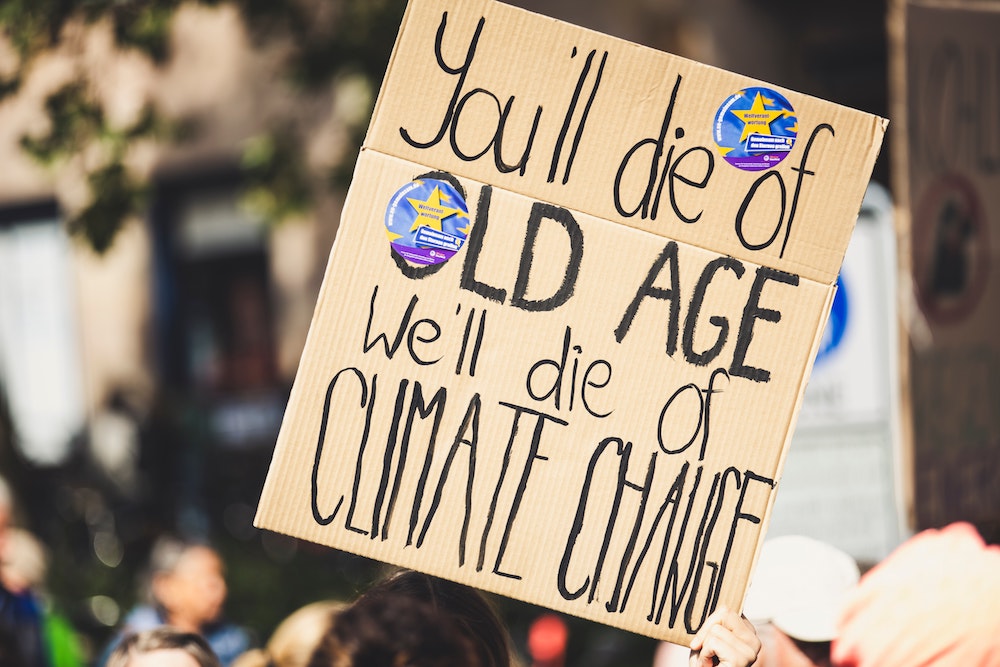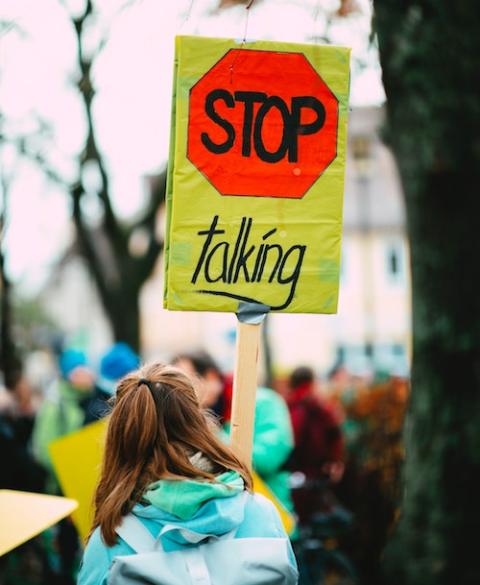
If countries do not commit to deeper cuts in greenhouse gas emissions, children born after 2020 will suffer far more than their parents and grandparents from heat waves, drought, flooding and crop failure. (Unsplash/Markus Spiske)
Editor's Note: EarthBeat Weekly is your weekly newsletter about faith and climate change. Below is the Oct. 1 edition. To receive EarthBeat Weekly in your inbox, sign up here.
Young people around the planet turned out again a week ago, on Sept. 24, for the first major day of climate protests since the coronavirus pandemic began, calling on world leaders to take strong action at the United Nations climate summit, COP26, in November.
It goes without saying that as the world warms, young people will suffer disproportionately from the impacts. They know that, and that's why they're protesting. But now some scientists have quantified that effect, and their figures paint a stark picture of what awaits.
In a study published Sept. 26 in the journal Science, the scientists calculate that even if countries comply with their current pledges to reduce greenhouse gas emissions, a person born in 2020 will experience between two and seven times as many extreme weather events, especially heat waves, as one born in 1960.
That's partly because more of the planet is expected to be affected by severe heat waves, they say — about 46% of Earth's land area could be affected by extreme heat by 2100 if countries meet their current pledges, compared to about 15% of land area affected now. Holding warming to the Paris target of 1.5 degrees Celsius above pre-industrial levels would reduce the area affected to about 22%.
That underscores the urgency of deeper cuts in greenhouse gas emissions than countries have been willing to make so far.
Along with heat waves, children born in 2020 will face increased likelihood of drought and crop failures compared to their parents and grandparents. And because the risk will continue to rise in the coming decades, each successive birth cohort will face more extremes than the one before.
Those impacts are also expected to be unevenly distributed around the globe, with children in low-income countries experiencing the greatest exposure to extreme weather, while those in high-income countries see less change from generation to generation.
The average age of the population tends to be younger in lower-income countries, placing even more children at risk.
"For example, 64 million children born in Europe and Central Asia between 2015 and 2020 will experience 3.8 to 4.0 times more extreme events under current pledges, but 205 million children of the same age in sub-Saharan Africa face a factor of 5.4 to 5.9 increase in lifetime extreme event exposure, including a factor of 49 to 54 increase in lifetime heat wave exposure," the scientists state.
The result, they say, is "a disproportionate climate change burden for young generations in the Global South."

(Unsplash/Markus Spiske)
The researchers note that their calculations do not include other factors that could affect children even more — if their families are forced to migrate because of drought, flooding or crop failure, for example, or if damage to schools puts their education on hold.
Nevertheless, the serious dangers that children will face even if countries comply with their current pledges are clear, they say: "Our results highlight a severe threat to the safety of young generations and call for drastic emission reductions to safeguard their future."
Governments — including the United States — will put new commitments to greenhouse gas reductions on the table during negotiations in Glasgow Nov. 1-12, but it is not clear whether they will achieve the target of holding global warming close to 1.5 C.
On Oct. 4, the feast of St. Francis of Assisi, Pope Francis, other faith leaders and scientists are expected to issue a strong statement to the world leaders who will gather in Glasgow. Francis has also said he hopes to take his message to that meeting in person.
The pope has consistently paid particular attention to young people, who will bear the brunt of the excesses of every generation since the Industrial Revolution.
In a video message Sept. 29 to a U.N.-sponsored "Youth4Climate" gathering in Milan, he urged his listeners to take the lead in creating a culture of care for one another and for the planet, reports Carol Glatz for Catholic News Service.
"Everything is connected and, as a family of nations, we must have a common concern: to see that the environment is cleaner, purer and preserved. And to take care of nature so that it takes care of us," Francis said.
That message has also been woven through EarthBeat's reflections for the Season of Creation, which will end Oct. 4. The series by Brenna Davis and Michael Downs of the Ignatian Solidarity Network has focused on our relationship with creation through the elements of air, water, earth and fire. And although there is grief for all that has been lost, they write this week, hope springs forth even after destruction by fire.
In his message to the youth gathering, Francis struck a note of hope mixed with urgency, saying, "Let us act with hope, courage and willingness, making concrete decisions. They cannot be put off until tomorrow."
Here's what else is new on EarthBeat
- For religious communities, real estate is an important asset that could provide significant revenue if sold for development. But many Catholic congregations are choosing to conserve some of their land permanently as part of their commitment to care for creation. NCR environment correspondent Brian Roewe and Global Sisters Report international correspondent Chris Herlinger have the story in the first part of a special series, "An Estate Plan for the Earth." Watch for additional stories in this series in the weeks ahead.
- The Vatican has pushed back the launch of its ambitious Laudato Si' Action Platform, which is meant to help Catholics worldwide implement Pope Francis' 2015 encyclical, until mid-November, writes Roewe.
- He also reports that U.S. Rep. Deborah Ross, a Democrat from North Carolina, told faith leaders in her state that they have an important role to play in promoting support for federal climate legislation included in two multitrillion-dollar bills currently under intense debate in Congress.
- As the Biden administration weighs expansion of Bears Ears National Monument in Utah, some Native American groups living near the area fear it will limit access to sites used for traditional rituals, writes Joseph Hammond for Religion News Service.
Advertisement
Here's some of what's new in other climate news:
- Oliver Milman at The Guardian writes that Disney, Apple, Amazon and Microsoft are among backers of groups lobbying against those major budget and infrastructure bills before the U.S. Congress, which include significant climate measures.
- Critics of the first U.N. Food Systems Summit, held Sept. 23, say it gave food conglomerates outsize influence, at the expense of the world's small rural producers, writes Greta Moran at Civil Eats.
- In Alaska, researchers are scrambling to design new kinds of houses that can won't collapse as the permafrost melts. Casey Quackenbush has the story for The Washington Post.
- Developers of a 116-mile natural gas pipeline from Pennsylvania to New Jersey have scrapped the project because of protests and regulatory roadblocks, reports Ry Rivard at Politico New Jersey.
- Tens of millions of gallons of flame retardant have been dropped over wildfires in the western United States in the past decade. Autumn Spanne at The Daily Climate takes a look at what that could mean for wildlife.
Upcoming events:
This week's events feature a presentation by Erin Lothes of the Laudato Si' Movement about "Climate Change and the Catholic Church Today," as well as a multifaith prayer service and an overview of an interreligious guide to care for our common home. You can find more information on the EarthBeat Events page, and you can add your own group's event here.
Closing beat:
The crucial U.N. climate conference known as COP26 will begin in a month in Glasgow, Scotland, and EarthBeat will be keeping an eye on the issues of importance to Catholics and other faith groups.
Do you have questions about the conference? Thoughts about how negotiators should address thorny issues? Drop us a line and let us know, at earthbeat.org.
Thank you for reading EarthBeat!







